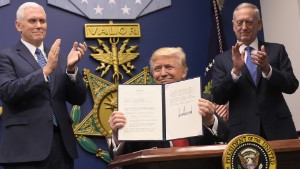Here's what Europe would think if Trump goes easy on Putin
President Donald Trump's hints about easing sanctions on Russia have been met with a clear European response -- please don't.
On Saturday, Trump is set to hold his first official phone call with Russian President Vladimir Putin, a day after a senior aide said Trump is considering lifting penalties put in place after Russia's intervention in eastern Ukraine and annexation of Crimea.
British Prime Minister Theresa May, visiting Washington Friday, made clear the UK's position -- sanctions should remain until Russia and the Ukrainian rebels it backs meet the requirements of a 2014 agreement to end hostilities.
If the US moves forward on sanctions without the backing of allies like the UK, Trump risks seriously straining ties with some of its oldest and most reliable allies, European countries are already unsettled by the President's stated desire to get closer to Russia and his suggestions that NATO is "obsolete."
Unilaterally easing Russia sanctions "would be another blow to US-EU relations," said Angela Stent, director of the Center for Eurasian, Russian and East European Studies at Georgetown University. "If sanctions are removed unilaterally it removes a major basis for trust between the two allies."
The Obama administration worked very closely to get the reluctant Europeans to impose sanctions, Stent recalled, only getting European buy-in after a Malaysian Airlines flight traveling from Holland to Malaysia was downed by a Russian-made missile.
What's more, she adds, "if the sanctions are lifted in the absence of agreement from our European allies and in the absence of the Russians fulfilling what they're supposed to do with regards to Minsk" -- the 2014 agreement to end the conflict -- "the Russians have gotten away with what they've done in Ukraine."
Trump was at his first White House press conference with a foreign leader Friday when he was asked about the possibility of removing penalties on Russia. Standing beside May, a bust of the British wartime leader Winston Churchill between them, Trump walked a careful line.
"As far as the sanctions, very early to be talking about that," he said. "We look to have a great relationship with all countries, ideally. That won't necessarily happen, unfortunately probably won't happen with many countries."
On Friday night, just hours ahead of Trump's call with Putin, a senior administration official said the current plan of the White House is not to ease sanctions.
May, who had spent the previous two days emphasizing UK solidarity with the new American administration, and had publicly warned about trusting Putin, was definitive about her position.
"As far as the UK is concerned, on sanctions for Russia in relation to their activities in the Ukraine, we have been very clear that we want to see the Minsk Agreement fully implemented," she said. "We've been continuing to argue that inside the European Union."
While Britain has chosen to leave the EU, diplomats said there's no daylight between the UK and the 27 countries remaining in the European bloc when it comes to Russia sanctions.
European diplomats told CNN that any decision the organization makes will be determined by EU interests -- and not political decisions by Trump in Washington.
Trump spoke of his desire for closer relations with Russia throughout the campaign, touting it as a plus if Moscow and the US could cooperate to defeat ISIS. Trump's desire for better relations with Putin became a fraught issue, as US intelligence agencies charged that Moscow had directed cyberattacks tied to the 2016 election with the aim of helping Trump.
Earlier Friday, top Trump adviser Kellyanne Conway told Fox News that lifting US sanctions on Russia would be up for discussion when Trump and Putin speak Saturday.
"All of that is under consideration," Conway said when asked specifically whether lifting sanctions approved by the Obama administration would be considered.
Trump had hedged in his White House remarks, saying, "I hear a call was set up and we will see what happens."
"I hope we have a fantastic relationship," he said of Putin. "That's possible, and it's also possible that we won't. We will see what happens."
After an initial attempt to improve relations with Russia, the Obama administration hit Russian banks, individuals, energy companies and defense contractors with sanctions in 2014 for their support for Ukrainian separatists. After Russia's annexation of Crimea, the US punished Russian individuals with asset freezes and travel bans.
And after intelligence agencies reached their conclusion about Russian interference in the election, the Obama administration expelled 35 Russian diplomats.
Derek Chollet, a senior adviser for defense and security policy at the German Marshall Fund, said it's not clear Trump will actually follow through on easing sanctions.
"This could be yet another idea that they've floated that they end up not doing," he said.
News Courtesy: www.cnn.com











